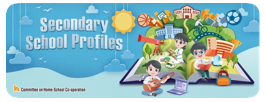Academic Committee
Aims
1. To build up serious learning and teaching culture and atmosphere, and enhance students’ interests and capabilities in learning.
2. To co-ordinate the development of subjects and library reading programmes to promote reading in school.
3. To develop school-based curriculum and effective learning and teaching strategies.
4. To promote different teaching methods and strategies to enhance the teaching effectiveness.
5. To develop systematic operational procedures.
6. To construct and develop the curriculum in accordance with the requirements of the Education Bureau.
7. To carry out national security education through curriculum and related activities, strengthen students' understanding of the rule of law and national conditions, understand the importance of safeguarding national security, and enhance the sense of national identity.
Members and Structure (25-26)
|
Chief AC Mistress |
: Vice Principal Ms. Wong HT |
|
|
Vice Principal Ms. Chiu MM |
|
Senior AC Master |
: Assistant Vice Principal Mr. Kwan SM |
|
|
Associate Principal (STEM) Mr. Yeung WS |
|
AC Master/ Mistress |
: Mr. Cheung SH, Mr. Lam WK, Ms. Yip SY |
| Members |
: Ms. Cheng SC, Ms. Poon SS, Mr. Lai HL |
|
Assistant |
: Ms. Wong HM, Ms. Wong HL |
|
General Office |
: Ms. Chan NY |
|
S1 AC Master |
: Mr. Lam WK |
|
S2 AC Mistress |
: Ms. Yip SY |
|
S3 AC Master |
: Mr. Cheung SH |
Faculties and Dean
|
Faculties |
Dean |
|
English |
CSH |
|
Chinese Language & Culture and History |
WHT |
|
STEM |
YWS, KSM |
|
Humanities |
LWK |
|
Creative & Performing Arts |
YSY |
|
Sports Science |
KSM |
Non-Chinese speaking (NCS) Students
Chinese Language and Putonghua: The school is currently designing and developing a school-based Chinese language curriculum for NCS students. NCS students are not required to take Putonghua lessons. Instead, they will be provided Chinese language consolidation training.
Social & Cultural Studies (SCS): Split-class arrangement is in place for NCS students, where English is the medium of instruction for the class. The subject requirements, including syllabus, assignments and assessments is the same as local students, despite being conducted in English.
Chinese History: Split-class arrangement is in place for NCS students. Small group teaching for NCS students also makes it easier to teach them the historical timeline through storytelling.
For examinations, a different set of paper will be provided for NCS students in Chinese Language and Chinese History. For Social & Cultural Studies, the papers would be set in English, with the same content as local students.

 m.TNKJSC(Mobile)
m.TNKJSC(Mobile)  x.TNKJSC(moXo)
x.TNKJSC(moXo)  b.TNKJSC(liBrary)
b.TNKJSC(liBrary) 